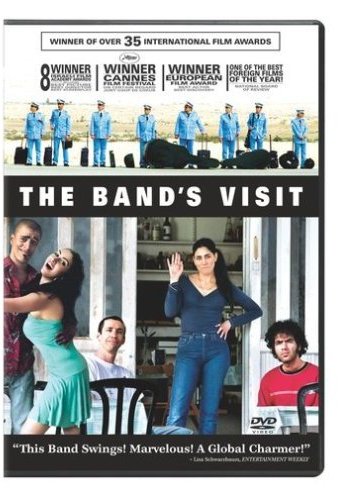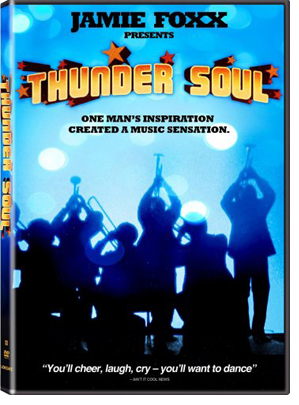 DVD: The Band’s Visit
DVD: The Band’s Visit
Theatrical Release: February 8, 2008
DVD Release: July 29, 2008
Starring Sasson Gabai, Ronit Elkabetz, Saleh Bakri, Khalifa Natour
Directed by Eran Kolirin
Deep Calling Unto Deep
?There’s nothing more lofty and more wonderful than our ability to be with each other and create. Why, this is a cure for everything!?
lead actress Ronit Elkabetz, from an interview about The Band’s Visit
Papi, a gawky young Israeli, is getting nowhere on his date with the morose young woman sitting beside him. On his other side, Haled, an experienced Arab Lothario, feels bad for them both and so begins to offer a series of pantomimed pointers.
He hands the young man his handkerchief; Papi figures out he is supposed to give it to the crying girl beside him and gently offers it to her.
Haled places his hand on the Jew’s knee; the Jew does likewise to the girl. The Arab caresses Papi’s knee with his thumb; Papi copies the motion on the girl’s knee.
Then the girl places her hand on Papi’s knee and Papi, getting his signals crossed, reaches over and places his hand on Haled?s. The Arab gently corrects him, and the date is a success.
?I didn’t feel like having one of those projects,? says Israeli director Eran Kolirin in the extras portion of the DVD, ?where Arabs and Jews are building a bridge between them and go on a trip together. That’s not it. And I think that everyone felt that we came here to find our own truth, inside ourselves.?
 This movie is not about Israelis or Arabs or the tensions between them, and neither does it advocate a means of bringing the two sides together. The Band’s Visit is about the arms of Love Itself inexorably extended out from one side to the other, symbolically spearheaded on the Israeli side by the sexual aggressor Dina (played by Ronit Elkabetz) and on the Arab side by the bedroom-eyed lover Haled (Saleh Bakri). When these two characters meet they appear conspiratorial; it is as if they have known each other for a very long time and have nothing new to say to each other.
This movie is not about Israelis or Arabs or the tensions between them, and neither does it advocate a means of bringing the two sides together. The Band’s Visit is about the arms of Love Itself inexorably extended out from one side to the other, symbolically spearheaded on the Israeli side by the sexual aggressor Dina (played by Ronit Elkabetz) and on the Arab side by the bedroom-eyed lover Haled (Saleh Bakri). When these two characters meet they appear conspiratorial; it is as if they have known each other for a very long time and have nothing new to say to each other.
Love Itself is gentle and kind, yet brooks no opposition. It moves on until it is received and That’s that. It asks for nothing in return?no peace talks, no commitments, and no settlement?but only to be allowed to continue flowing onward until it is admitted. Sometimes its only refuge is with itself.
Love Itself is tender and mocking and confident and instructive. It’s also a trickster throwing a necessary wrench into the works, as Haled does when he is told to get directions to a town called Petah Tikvah and instead brings back directions to Beit Hatikvah.
One playful motif in the film is the singing of classic jazz songs, a metaphor of deep significance in light of the tensions between the two ethnic groups. A brief and inexplicable peace descends when these songs are sung.
Haled, for example, silences and mesmerizes young girls by asking, ?Do you like Chet Baker?? and then launching into a low, crooning version of ?My Funny Valentine.? An extremely awkward dinner between reluctant guests and still more reluctant hosts is given respite when the men break into an off-key version of ?Summertime? in two kinds of broken English.
From both sides Love Itself is manifested every time music is made. ?It will flame out,? as Hopkins said, ?like shining from shook foil,? despite long-standing historical divisions.
The extreme commonness of some of the details?the sound of seven suitcases wheeling over a gravel field, a cleaner sullenly pushing a supply cart in front of a group being photographed?is almost shocking to a North American film viewer. This is refreshing; there is nothing rose-coloured about this view of life but neither does it wallow in grittiness.
The classical Egyptian song the band plays at the end is so wise and joyful that nothing else needs be said. It lauds the indomitable character of art as a compassionate response to a suffering humanity and speaks into the possibility of a future world that can be treasured whether or not it can ever exist.
The Band’s Visit manifests seven of The Mindful Bard’s criteria for movies well worth watching: 1) it is authentic, original, and delightful; 2) it mocks existing injustices; 3) it gives me tools enabling me to respond with compassion and efficacy to the suffering around me; 4) it makes me want to be a better artist; 5) it displays an engagement with and compassionate response to suffering; 6) it inspires an awareness of the sanctity of creation; and 7) it provides respite from a sick and cruel world, a respite enabling me to renew myself for a return to mindful artistic endeavour.

